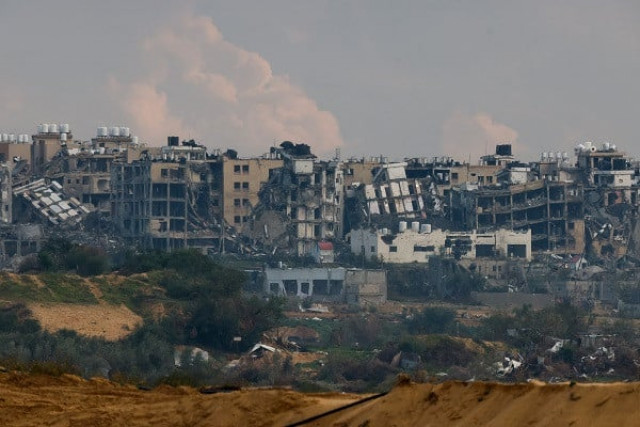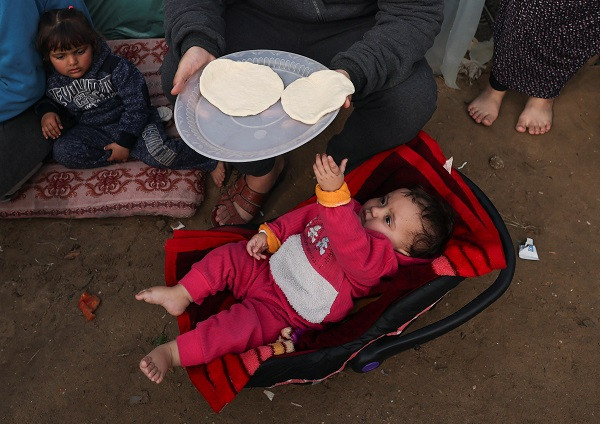Killing of Hamas deputy leader in Beirut raises risk of Gaza war spreading
Hezbollah leader Hassan Nasrallah vows 'severe reaction'

Israel assassinated Hamas deputy leader Saleh al-Arouri in a drone strike in Lebanon's capital Beirut on Tuesday, Lebanese and Palestinian security sources said, raising the potential risk of war in Gaza spreading well beyond the besieged Palestinian enclave.
Arouri, 57, was the first senior Hamas political leader to be assassinated since Israel launched a shattering air and ground offensive against the group almost three months ago after its shock assault on October 7.
The Gaza health ministry said 207 people had been killed in the past 24 hours, bringing the total recorded Palestinian death toll to 22,185 in nearly three months of war in Gaza.
Footage shows the moment when israel fired 3 missiles from a drone in Beirut, assassinating Hamas leader Arouri.
— Arya - آریا 🇮🇷 (@AryJeay) January 2, 2024
The important aspect here is that the assassination was carried out by air, violating Seyyed Nasrallah’s prior warnings. This won’t go unanswered. https://t.co/w1ALTdrZuL pic.twitter.com/anEz1c0bpZ
Lebanon's heavily armed Hezbollah group, a Hamas ally, has been exchanging near-daily fire with Israel across Lebanon's southern border since the war in Gaza began in October. Hezbollah attacks have severely degraded Israel's surveillance capabilities in the border region and have inflicted significant casualties on the Israeli forces.
Hezbollah leader Hassan Nasrallah has warned Israel against carrying out any assassinations on Lebanese soil, vowing a "severe reaction."
Hezbollah said on Tuesday it had targeted a group of Israeli soldiers in the vicinity of Marj with missiles, following Arouri's killing.
🟡 Hezbollah has issued a statement:
— Arya - آریا 🇮🇷 (@AryJeay) January 2, 2024
We consider the crime of assassinating Sheikh Saleh Al-Arouri and his fellow martyrs in the heart of the southern suburb of Beirut to be a serious assault on Lebanon, its people, its security, sovereignty, and resistance, and the highly… pic.twitter.com/jbhbLO8lD8
Israel has long accused Arouri of lethal attacks on its citizens, but a Hamas official said he was also "at the heart of negotiations" conducted by Qatar and Egypt over the outcome of the Gaza war and the release of Hamas-held Israeli hostages.
Israel neither confirmed nor denied carrying out the killing, but its military spokesperson Rear Admiral Daniel Hagari said Israeli forces were in a high state of readiness and prepared for any scenario.
"The most important thing to say tonight is that we are focused and remain focused on fighting Hamas," he said when asked by a reporter about the reports of Arouri's killing.
'Waiting for martyrdom'
Israel had accused Arouri, a co-founder of the Hamas' military wing, the Izz-el-Deen al-Qassam Brigades, of ordering and supervising Hamas attacks in the Israeli-occupied West Bank for years.
"I am waiting for martyrdom and I think I have lived too long," Arouri said in August 2023, alluding to Israeli threats to eliminate Hamas leaders whether in Gaza or abroad.
⚡️WATCH: Al-Quds Brigades published a video showing scenes of its forces targeting IOF military vehicles in the Al-Tuffah & Al-Daraj axis, east of Gaza. pic.twitter.com/3YtJaYP2hY
— Arya - آریا 🇮🇷 (@AryJeay) January 2, 2024
Nasser Kanaani, spokesperson for the foreign ministry of Iran said Arouri's killing would "undoubtedly ignite another surge in the veins of resistance and the motivation to fight against the Zionist occupiers, not only in Palestine but also in the region and among all freedom-seekers worldwide."
Hundreds of Palestinians took to the streets of Ramallah and other towns in the West Bank to condemn Arouri's killing, chanting, "Revenge, revenge, Qassam!"
Hamas responds to ceasefire proposal
Shortly before Arouri's killing, Hamas' paramount leader Ismail Haniyeh said the movement had delivered its response to an Egyptian-Qatari ceasefire proposal.
He reiterated that Hamas' conditions entailed "a complete cessation" of Israel's offensive in exchange for further release of captives.
Israel believes 129 captives remain in Gaza after some were released during a brief truce in late November and others were killed during Israeli air strikes and botched rescue or escape attempts.

A baby reaches for a plate of food as displaced Palestinians, who fled their homes due to Israeli strikes, shelter at a tent camp. PHOTO: Reuters
Israel has vowed to keep fighting until it has wiped out Hamas but it is unclear what it plans to do with the enclave should it succeed, and where that leaves the prospect of an independent Palestinian state.
In Washington, the State Department denounced as "inflammatory and irresponsible" statements by Israeli cabinet ministers Bezalel Smotrich and Itamar Ben-Gvir advocating for the resettlement of Palestinians outside of Gaza.
Such statements underscore fears among some in the Arab world that Israel wants to drive Palestinians out of the land where they envision a future state, repeating the mass dispossession of Palestinians when the settler-colonial state of Israel was created in 1948.



















COMMENTS
Comments are moderated and generally will be posted if they are on-topic and not abusive.
For more information, please see our Comments FAQ